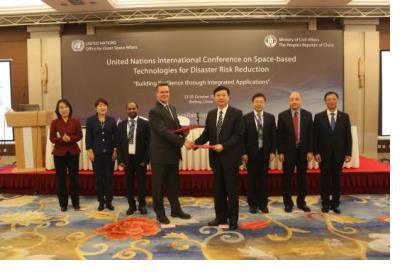The United Nations International Conference on Space-based Technologies for Disaster Risk Reduction – "Building Resilience through Integrated Applications" was opened yesterday in Beijing, China and will continue until 25 October 2017. About one hundred participants from 34 countries and 8 regions are participating in the conference.
The conference is co-organized by UN-SPIDER Beijing Office of the UN Office for Outer Space Affairs (UNOOSA) and the Ministry of Civil Affairs of the People's Republic of China (PRC), in collaboration with the Ministry of Foreign Affairs (MoFA) of PRC, the Ministry of Finance of PRC, the Department of Systems Engineering, China National Space Administration (CNSA) and the Asia Pacific Space Cooperation Organization (APSCO). The World Bank is also supporting the conference.
The conference occasion is also used to exchange the agreement between Ministry of Civil Affairs, The People's Republic of China, and United Nations Office for Outer Space Affairs related to Chinese support to the UN-SPIDER Beijing office.
The conference comprises a keynote session, 5 plenary sessions, 6 parallel working group sessions, a concluding session consisting of 44 presentations and institutional visits to two organizations. Experts and officials from different parts of the world lead the deliberations in the plenary sessions and parallel working groups. The institutional visits take place in National Disaster Reduction Centre of China and China Academy of Space Technology (CAST) Exhibition Centre.
The plenary and parallel sessions of the conference cover the following topics:
- Policy and institutional arrangements for integrating 'space' in DRR decision making
- Integration of space and in-situ data for disaster risk reduction
- Technology integration for disaster risk assessment and emergency response
- Integrated applications of Earth observation, global navigation satellite system and telecommunication constellations for disaster risk reduction and climate change related extreme hazards
- Networking and engagement with the UN-SPIDER network.
The Conference is bringing together national organizations involved in disaster management and generating geospatial information in the countries where UN-SPIDER technical advisory support was provided or offered. The Conference is also attended by representatives of the UN-SPIDER regional support offices, various regional and international organizations, and experts from centres of excellence from different parts of the world.
The Conference marks another step in the long-term effort of the Office for Outer Space Affairs and UN-SPIDER to build on the commitments of the Sendai Framework and the 2030 Agenda for Sustainable Development through UNISPACE+50.

